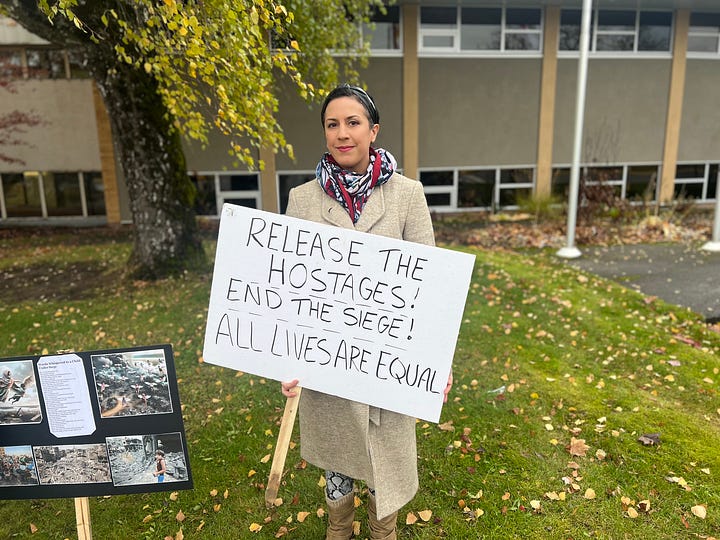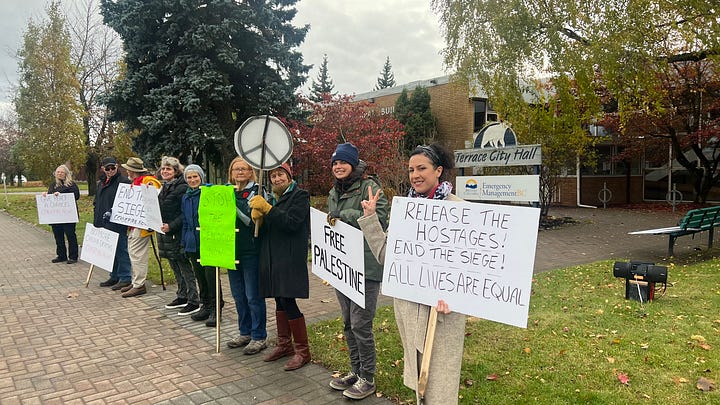Terrace protesters rally for ceasefire, peace in Israel-Hamas conflict
Locals gather weekly at Terrace City Hall, call for an end to violence


Anti-war protesters took to Terrace City Hall on Sunday for the third-week in a row to call for a ceasefire and peace amid the Israel-Hamas war.
Protest organizer Flo Schade sent out her first social media call-out for a peace vigil over three-weeks ago, calling for others to join her. She said it has since grown into a weekly gathering for those against the war.
The latest Israel-Hamas war has quickly become the deadliest and most destructive of the five wars fought between the sides since Hamas seized control of the Gaza Strip in 2007 from the Palestinian Authority.
On Oct. 7, Palestinian Islamist militant group Hamas conducted a series of coordinated attacks on Israel. Since then, Israel has relentlessly pounded the Gaza Strip with airstrikes that have wrought unprecedented destruction, flattening entire neighbourhoods.
The Associated Press estimates the combined death toll to be over 11,000 people.
In an interview with The Skeena Reporter, Schade said that the events of the last few weeks have been "horrific to witness," adding that when she started the protest, there were an estimated 3,000 children killed in Gaza and just three weeks later, that number is over 4,000.
Schade said that she was inspired to start the weekly protest after seeing people rally together around Canada and around the world.
"I wanted to do something rather than just yell at the screen at home," Schade said. "I was tired of just doing nothing."
"We're trying to pressure our leaders to call for, at the very least, a ceasefire and give a voice to local folks that are feeling frustrated and helpless," Schade said. "We're also trying to connect and create a community with other like-minded people to show solidarity with people that want the siege to end and to call for, at the very least, a ceasefire."
Valerie Wright, a retired mental health clinician, said that she attended the protest because it was really important for politicians to see people are fed up with the federal government's response to the war.
"I think it's really important because I think politicians do, actually, watch and see how many people are protesting and the places they're doing so," Wright said.
Wright, who was an anti-war activist in the 1960s during the "Ban the Bomb" protests, said that she believes that the Palestinian people are being pushed further and further away from their homes and don't know where to go anymore.
"With all the children dying, I just think it's terrible," Wright said. "I don't think killing people does anything. We need peace."
"It's not even about taking sides," Wright said. "It was terrible what happened to Israel [on Oct. 7] with the slaughter of civilians, but what's happening right now just has to stop."
Schade said that she feels that the tide is shifting, when it comes to talking about the Israel-Palestine conflict — something that was difficult to talk about without fear of reprisal even just a month ago.
"We're also protesting to let others know that it's okay to take a stand, too, because I feel that a lot of people fear that they will be labeled an anti-Semite, if they don't say the right thing," Schade said. "Now, there's more room for real discussion and dialogue about what's happening and I don't know if that would be the case if there weren't demonstrations like this one and those all over the world."
Schade said that she was quoted as saying she's calling for a ceasefire last week in another local publication, but that's bare minimum. "The minimum condition to work towards peace — and sustainable peace, at that — is a ceasefire."
"In terms of any self-determination in the area, it's really going to be up to the people in the region — Israelis and Palestinians — but what we can do here is make sure that our voices are known and heard and our leaders hear our voices and demands," Schade said. "Trudeau almost said the word 'ceasefire,' but quickly cut himself off when he remembered that he wasn't supposed to call for that."
In a press conference on Nov. 3 in Washington, Trudeau called for a "humanitarian pause" in the Israel-Hamas war, highlighting the need to protect civilian lives in Gaza. He is heard saying, "We need to see a cease-, we need to see a humanitarian pause ... We need a cease of the levels of violence that we're seeing."
Schade said that "most people just don't think a ceasefire is good enough."
Schade reiterated her call for the two parties to stop the bloodshed, adding all the killing and trauma of that on innocent civilians is horrific to see.
"A lot of legal scholars and humanitarian rights groups, including some Jewish ones in Israel, have said that the conflict is looking like a genocide and I think it's hard to argue with that," Schade said. "It's been long known that the occupation of Gaza and the West Bank, as well as other parts of Palestine, have resulted in a de facto apartheid state."
Schade said there is no way to a condition of sustainable peace with bombs raining down killing innocent civilians.
Since 1948, Israel and Palestine have fought numerous wars.
The two-state solution, which would see the creation of the Palestinian state and Israel either maintain or give-up some of the land it occupies, has been rejected by the Palestinians on a variety of occasions for different reasons.
Schade believes that Oct. 7 is a turning point in the movement for Palestinian statehood, saying, "The status quo prior to Oct. 7 was not good enough and the situation will not lead to sustainable peace. Whether peace means a two-state solution or a one-state secular democracy is going to be up to the people there."
Right now, though, Schade said that we don't have the conditions for peace and the very first step has to be a ceasefire, or at least giving space for negotiations to happen.
"We don't have any of the conditions for peace right now," Schade said. "We didn't have those before either. There's no path to peace under occupation and apartheid either — something has to change."
"We don't know what that could be until the siege and genocide stops," Schade said.
"Until then, we'll be here every Sunday until it starts snowing and then we'll take it inside," Schade said.
Schade said she hopes to get others involved in the fight for peace.
Schade is hoping to create more dialogue on the conflict and the circumstances that caused it through "teach-ins." She doesn't know where they'll happen exactly, but encourages concerned residents to join the Skeena Local Action Network Facebook Group where she’ll post more information, once she has more of an understanding on the logistics of the event.
"It's good for the soul in times like these — where the world seems to be falling apart in a lot of ways — to come together as a group and voice our opinions," Schade said.
With files from The Associated Press
This story was updated on Nov. 5 at 10:05 p.m. to clarify Schade didn't coin the term “learn-in.” It has been used widely for anti-war and other social justice issues past and present.

